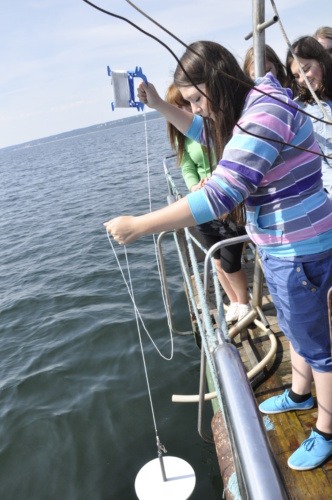Projekt: Minimonitoring wód przybrzeżnych Zatoki Gdańskiej w okolicy Gdyni
Koordynator projektu: Akwarium Gdyńskie MIR-PIB

Program „Minimonitoring wód przybrzeżnych Zatoki Gdańskiej w okolicy Gdyni” był realizowany w latach 2006 – 2011 w ramach „Konkursu na zadania z zakresu edukacji ekologicznej dla woj. pomorskiego” dofinansowanego ze środków Wojewódzkiego Funduszu Ochrony Środowiska i Gospodarki Wodnej w Gdańsku. Zajęcia skierowane były do młodzieży szkół średnich, gimnazjalnych i podstawowych w woj. pomorskim (spoza Trójmiasta), pragnąc w ten sposób wyrównać szanse w zakresie dostępu do informacji i edukacji ekologicznej. W programie wzięło udział 3262 uczniów i 319 opiekunów.
Celem nadrzędnym programu było kształtowanie postaw proekologicznych wśród młodzieży oraz wzbudzanie poczucia odpowiedzialności za czystość środowiska naturalnego poprzez aktywne poznawanie źródeł, rodzajów i skutków zanieczyszczenia Morza Bałtyckiego oraz sposobów jego ochrony. Aby osiągnąć ten cel uczniowie otrzymali za zadanie monitoring wód przybrzeżnych Zatoki Gdańskiej w okolicy Gdyni. Młodzież szkół ponadgimnazjalnych i gimnazjalnych odbyła rejsy kutrem hydrograficznym i warsztaty w laboratoriach Akwarium Gdyńskiego MIR-PIB. W czasie rejsu uczniowie poznali sprzęt do badań oceanograficznych, pobrali próby wody przy użyciu batymetru oraz fauny i flory bałtyckiej. Następnie w laboratoriach Akwarium młodzież dokonała badań fizykochemicznych wody, ukazując stan jej czystości oraz analizy jakościowej zebranego materiału biologicznego. Uczniowie szkół podstawowych uczestniczyli w warsztatach, w czasie których pobrali próbki fauny i flory z nabrzeża w rejonie portu gdyńskiego. Samodzielnie pobrane organizmy oznaczono w trakcie zajęć laboratoryjnych. Warsztaty dla uczniów ze wszystkich typów szkół wzbogacone były prezentacją multimedialną dostarczającą informacji o Morzu Bałtyckim. Metody monitoringu wód bezpośrednio aktywizowały uczniów, skłaniały do wyciągania wniosków o stanie środowiska naturalnego. Całość warsztatów wzbogaciła wiedzę uczestników, a samodzielność wykonywanych badań pozwoliła na bezpośrednie ukazanie walorów oraz realnych zagrożeń wód przybrzeżnych Zatoki Gdańskiej.
Po zakończeniu warsztatów uczniowie zwiedzili ekspozycję Akwarium Gdyńskiego, w tym część ekspozycji dotyczącej ochrony środowiska Morza Bałtyckiego – „Eutrofizacja Morza Bałtyckiego”.
Autor: Magdalena Kalinowska
